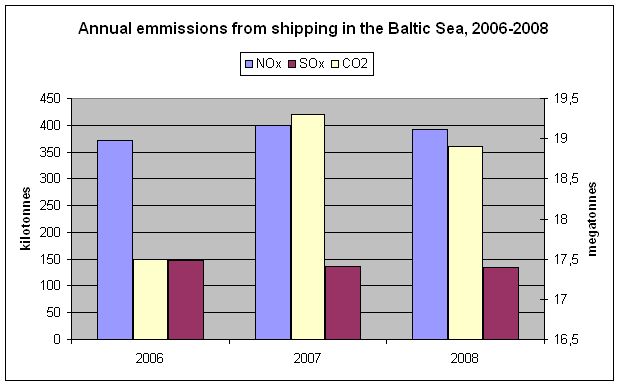Emissions from ships
Increasing shipping activities contribute significantly to the air and sea pollution in the Baltic Sea region.
Emissions of SOx from shipping due to combustion of marine fuels with high sulphur content contribute to air pollution in the form of sulphur dioxide and particulate matter, harming the environment through acidification as well as human health, particularly around coastal areas and ports.
NOx emissions from ships, like SOx emissions, cause acid depositions that can be detrimental to the natural environment and most importantly contribute to eutrophication. Shipping (in both Baltic and North Seas) is among the largest contributors to NOx deposition to the Baltic Sea. According to the recent estimates, the total NOx emissions from ships in the Baltic were more than 393 kton NOx in 2008. Within 2000-2006, shipping in the Baltic was the second largest contributor (9%) to the deposition of nitrogen oxide, and the fifth greatest contributor (5%) to the total nitrogen deposition to the Baltic Sea.
In addition to SOx and NOx shipping is also contributing to the emissions of greenhouse gases (mainly CO2), ozone-depleting substances and volatile organic compounds (VOC), which are mainly generated during tanker loading operations in ports.
Globally air pollution from ships is regulated by Annex VI of IMO's MARPOL 73/78 on "Regulations for the Prevention of Air Pollution from Ships".
Annex VI of MARPOL 73/78 makes the Baltic a "SOx emission control area", demanding as of 19 May 2006 all ships either to use fuel oil with sulphur content not exceeding 1.5% or emission-cleaning systems reaching equivalent standards. According to the recently revised Annex VI, the sulphur content of any fuel oil used onboard ships within the Baltic SECA will be further decreased, to 1.0 % m/m during 2010 and to as little as 0.1 % m/m in 2015.

Figure 1. Annual emissions of NOx, SOx (in kilotonnes) and CO2 (in megatonnes) from shipping in the Baltic Sea, 2006-2008
Recent HELCOM actions
Due to the international character of shipping the measures adopted at HELCOM scale will only have limited impact on the emissions from shipping in the Baltic. Therefore, HELCOM is first of all taking active part in the global actions within the International Maritime Organization (IMO) to reduce air pollution from ships.
The call for stricter IMO requirements is part of the HELCOM Baltic Sea Action Plan to drastically reduce pollution to the sea and restore its good ecological status by 2021.
To implement the agreed actions HELCOM countries jointly made a submission to IMO to support the revision process of Annex VI aiming at tightening the emission requirements (MEPC 57/INF.14). The joint paper has been based on the results of the Estonian-Finnish research programme (www.shipnodeff.org) providing the first most precise estimate of the atmospheric emissions from shipping in the Baltic Sea as well as a set of scenarios estimating how much NOx emission from ships in the Baltic would be reduced if different proposed IMO emission control measures were adopted. The scenarios show that only the most challenging proposal - 80% reduction of emissions from marine diesel engines installed on ships on or after 1 January 2015 - would reverse the increasing trend of NOx emissions by 2030. (Emissions of NOx from Baltic shipping and first estimates of their effects on air quality and eutrophication of the Baltic Sea). Therefore, the HELCOM Contracting States have established a Correspondence Group to collect the necessary information to propose to IMO designation of the Baltic Sea as a NOx Emission Control Area (NECA), whereby ships constructed on or after 1 January 2016 and operating within a NECA would be required to reduce their NOx emissions by 80% in comparison to the current situation.
The HELCOM Contracting States also made a joint submission to IMO to support efforts under the review process of Annex VI to tighten sulphur content in fuel oil (MEPC 57/4/20).
Additionally, new HELCOM Recommendation 28E/13 “Introduction of economic incentives as a complement to existing regulations to reduce emissions from ships” has been adopted to encourage further reductions.
The incineration of wastes other than ship-generated wastes is prohibited throughout the Baltic Sea, and no incineration is permissible in the territorial seas of the Baltic Sea States.
Links
Emission trading for sulphur and nitrogen oxides – means to green maritime shipping, 2007 (Sjöfartsverket)
Jalkanen, J.-P., Brink, A., Kalli, J., Pettersson, H., Kukkonen, J., and Stipa, T.: A modelling system for the exhaust emissions of marine traffic and its application in the Baltic Sea area, Atmos. Chem. Phys. Discuss., 9, 15339-15373, 2009
(http://www.atmos-chem-phys-discuss.net/9/15339/2009/acpd-9-15339-2009.pdf)

